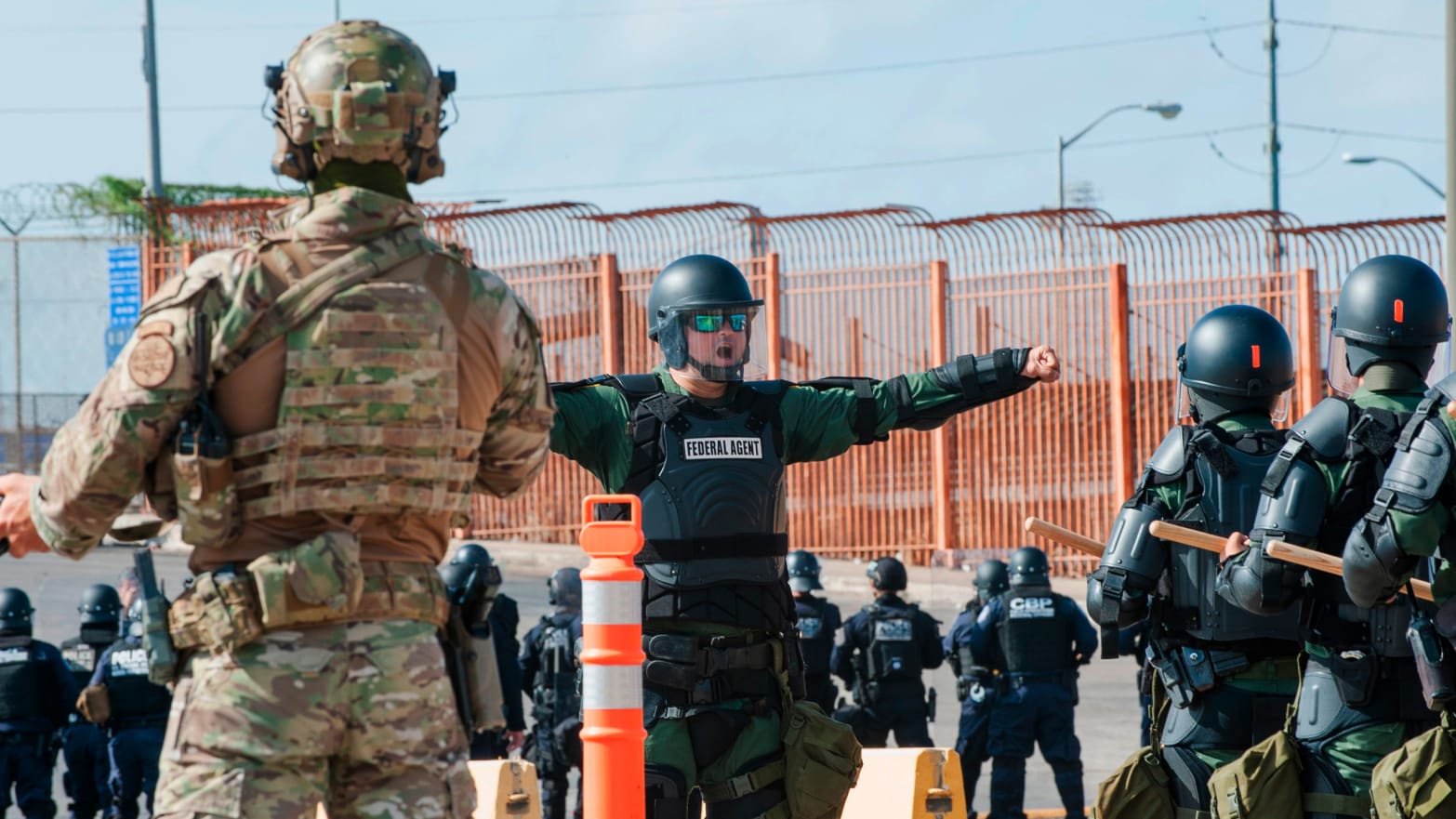In the waning days of the midterm election campaign, President Donald Trump announced a nebulous plan to deny the right of asylum to tens of thousands of immigrants seeking safe haven in the United States.
One week later, that plan is starting to take shape, with the issuance of joint rules by the Department of Justice and the Department of Homeland Security declaring that immigrants who contravene a presidential suspension or limitation on entry into the United States “will be rendered ineligible for asylum.”
Trump has not yet issued that suspension or limitation, which he said last week would take the form of an executive order, but is expected to move forward tomorrow, according to three senior administration officials during a background briefing call with reporters on Thursday afternoon.
“Those who enter the country between ports of entry are knowingly and voluntarily breaking the law—it’s a federal crime,” a senior administration official said. “While immigration laws do afford people various forms of protection, the reality is that it’s a violation of federal law in the manner that these illegal aliens are entering the country.”
Another official cautioned that “we don’t have anything to announce about any presidential proclamations” at this time, but the president has teased an executive order that would block all migrants from seeking asylum in the United States between “valid ports of entry.” Any asylum seeker who entered the United States from Mexico by any other means than one of the 48 border crossings at the U.S.–Mexico border, under such a proclamation, would not be eligible to seek asylum.
In a joint statement accompanying the joint rules, Secretary of Homeland Security Kirstjen Nielsen and Acting Attorney General Matthew G. Whitaker declared that the president “has the broad authority to suspend or restrict the entry of aliens into the United States if he determines it to be in the national interest to do so,” adding that “our asylum system is overwhelmed with too many meritless asylum claims from aliens who place a tremendous burden on our resources, preventing us from being able to expeditiously grant asylum to those who truly deserve it.”
The Trump administration’s announcement demonstrates that the president plans to follow through with promises made in the final weeks of the midterm campaign to fight what he has described as an “invasion” of undocumented immigrants, asylum-seeking and otherwise, from across the U.S. Southern border.
The proclamation is in direct conflict with established federal and international laws that prevent the U.S. government from returning asylum-seekers to countries where they face persecution, torture or death. The Immigration and Nationality Act stipulates that “any alien who is physically present in the United States, or who arrives in the United States (whether or not at a designated port of arrival…), irrespective of such alien’s status, may apply for asylum.” Asylum claims, which are part of the legal immigration process, may be made at any time, including after an asylum-seeker is detained and charged with illegal entry.
“U.S. law specifically allows individuals to apply for asylum whether or not they are at a port of entry,” said Omar Jadwat, director of the ACLU’s Immigrants’ Rights Project. “It is illegal to circumvent that by agency or presidential decree.”
Hours before the briefing, NBC News reported that the White House expects to be sued over the legality of the executive order almost immediately—but has wagered that the presence of Justice Brett Kavanaugh on the Supreme Court, a longtime friend of expanded power for the executive branch, will lead to a favorable ruling from the nation’s highest court.
Asked how the administration could justify such a blatant violation of federal law, a senior Trump administration official on the call cited the Supreme Court’s ruling in Trump v. Hawaii, better known as the travel-ban case, which gave the president broad authority to limit entry into the country by certain classes of immigrants.
When Trump first announced his then-undefined executive order last week, civil liberties groups and legal non-profits vowed to pursue all legal avenues to prevent the executive order from taking effect.
“If [Trump] plans at some point to prohibit people from applying for asylum between the ports of entry, that plan is illegal,” said Jadwat at the time, who additionally dismissed much of the anti-immigrant rhetoric as an attempt to invigorate Trump’s base ahead of the midterm elections.
Beyond this latest attempt to prevent asylum-seekers from entering the United States, Trump has also called for the deployment of as many as 15,000 active-duty troops to the Southwest border to prevent illegal entry, shared an anti-immigrant political advertisement that was deemed too racist for air by Fox News, and called for an end to the constitutional right to birthright citizenship.
The Trump administration has also waged a shadow war against asylum rights for migrants fleeing persecution and government instability, specifically. In July, U.S. Citizenship and Immigration Services modified the guidelines for Justice Department screening policies for potential asylees, urging case officers to reject applicants who cited fear of gang violence or domestic abuse as the reason for their asylum claims.
“Claims based on... the members’ vulnerability to harm of domestic violence or gang violence committed by non-government actors will not establish the basis for asylum, refugee status, or a credible or reasonable fear of persecution,” that guidance stated.
The American Civil Liberties Union later sued the Trump administration over the guideline, noting that the right to asylum—which may be granted to those who have been persecuted or fear persecution due to their race, religion, political affiliation, nationality, and/or group membership—must be extended to any asylum-seeker who has a credible fear of being persecuted, tortured, or killed in their homeland, regardless of the identity of the persecutor.

